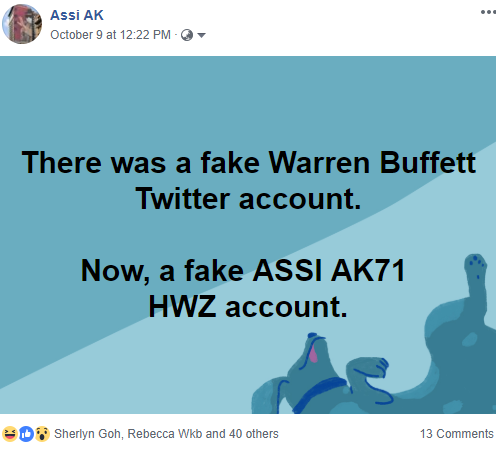This blog post is inspired by what I read at Bully the Bear. The blog master is now helping his parents manage some of their savings to secure higher returns. The money would have gone into fixed deposits, otherwise. Read: Why my parents are so eager to invest.
My parents also leave money in fixed deposits which they say give them a peace of mind. Whether it is a good idea or not is, of course, open to debate. However, peace of mind is priceless. If they do not wish to put their savings in "risky" investments, I won't go against them. This also gives me a peace of mind because if the "risky" investments turned out badly and I was the one who asked them to invest, then, it would be a nightmare of epic proportions.
 |
| Photo taken when I went on a cruise with my parents. |
In recent years, however, my mom saw how my investments delivered regular income and instead of being purely a market speculator, she decided to have me help her invest some of her money. She now gets more than $1,000 in passive income from stocks per month which is a nice bit of extra money for a person in her 60s.
More recently, my dad asked me if I could help him invest some of his savings as well. Of course, I have to do it. Why? He is my father. No other reason needed.
I told him that I could possibly get an 8% yield for him but the principal sum will have to be locked up for at least 5 years. That was my only condition. So, he has to be sure that it is money he will not need. At the end of the 5 year period, he will get 100% of his capital back if that is what he wants or he could stay invested.
How am I going to achieve this over the next 5 years? Honestly, all things remaining equal, with great difficulty, I suspect.
I could consider investing in the following:
1. Sabana REIT
2. Croesus Retail Trust
3. SPH
4. NeraTel
5. Hock Lian Seng
There are many things we can say about Sabana REIT but the distribution yield is rather attractive with unit price just 1c shy of $1.00 and there is a chance it could go a bit higher with an occupancy level of under 92% now. This allows ample room for improvement.
Croesus Retail Trust has retreated in price since going XD. It is now close to my entry price. This Trust is going to deliver a higher distribution yield than Sabana REIT and if things go the way I expect them to, it could do even better in future.
SPH has always been a favourite of mine as a blue chip investment for income. With the listing of SPH REIT, I like SPH more now and increased my long position in the stock last year. SPH will increasingly morph into an asset light property play even as it tries to reverse the decline in its traditional print business.
Regular readers will remember how I increased my long position in NeraTel by 10x last year in an effort to divert resources into stocks which will not be affected badly by any increase in interest rates. NeraTel is still a net cash company with strong earnings which should see meaningful improvements over time as the company sets up offices in new markets.
Hock Lian Seng is an investment I have held for a few years now. I initiated a long position in the stock shortly after its IPO. It has a strong balance sheet and rather stable earnings. It pays out about 40% of its earnings as dividends. It is one of those stocks that I almost forget I have until it is time for it to pay a dividend again.
If I were to divide my dad's money into 5 equal portions and invest in the above, I estimate that I could possibly get a yield of about 7%.
So, how am I going to deliver the estimated 8% yield?
I am going to cheat.
 |
| OMG! AK is going to cheat! |
Bad AK! Bad AK!
OK, I am so ashamed of myself. You can stop reading now.
Pause.
Pause.
Pause.
Er... Still reading? You really want to know?
 |
| Let there be light! |
OK, then, my plan is to keep the money that my dad is entrusting to me in my war chest. Then, I will deliver the 8% yield from my existing investments while I wait for prices to go lower before accumulating with bigger margins of safety.
There is no hurry for me to buy anything from Mr. Market. Well, maybe I could increase my investment in Croesus Retail Trust which I believe is rather attractive if 87c should be retested.
What if prices did not retrace lower but stay at current levels or go higher?
Well, anyway, I have always planned on using a good part of the income that is generated by my portfolio to support my parents when they are no longer working. So, this proposed arrangement is just a matter of utilising my passive income earlier than planned.
It will make my dad happy and that gives me a peace of mind.
Note: If anyone is wondering whether to start an investment portfolio based on the 5 securities I have highlighted in this blog post, please read the disclaimer found at the end of the page first.
Related posts:
1. A strategy to grow wealth and augment income.
2. Hock Lian Seng: DPS of 1.8c.
3. Croesus Retail Trust: Luz Omori and Niz Wave I.
4. SPH: Results are within expectations.
5. Sabana REIT: Am I buying or selling?

























